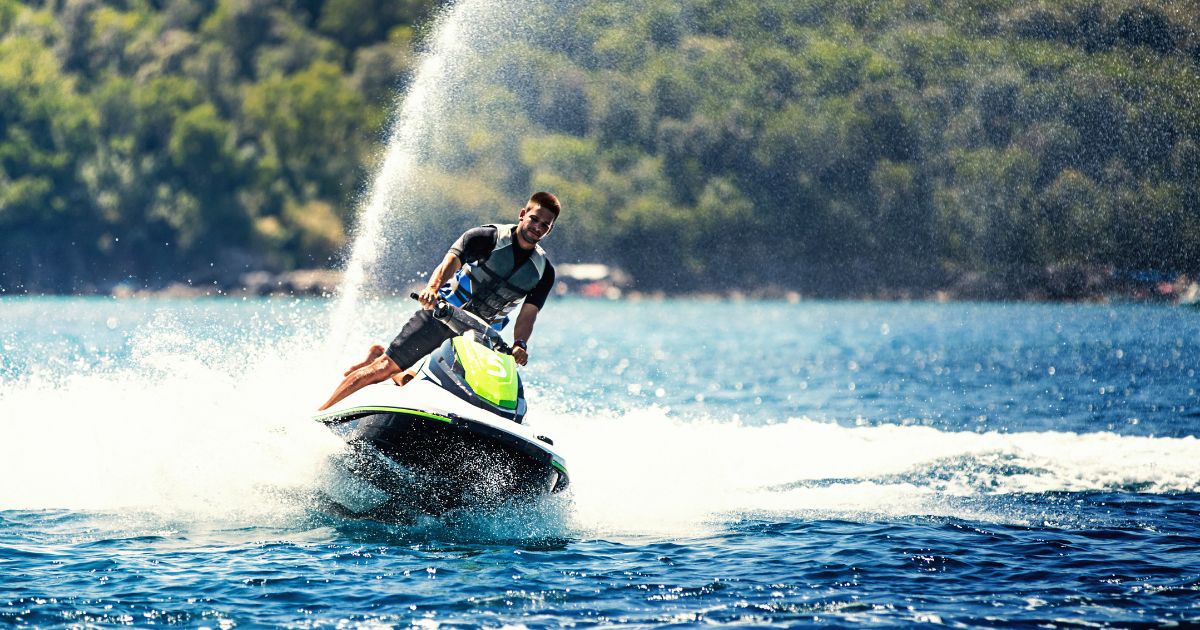Michigan's picturesque lakes and rivers attract water enthusiasts from far and wide, offering countless opportunities for adventure and recreation. Among the various watercraft that dot the state's pristine waters, jet skis, also known as personal watercraft (PWCs), have surged in popularity over the years. These nimble machines provide an exhilarating experience, allowing riders to zip across the waves with unparalleled speed and agility.
However, beneath the surface of excitement lies a sobering reality: jet skis pose significant risks to their operators and others sharing the water. Despite constituting only a fraction of the total registered boats in Michigan, statistics from the U.S. Coast Guard reveal a troubling trend. Jet skis are involved in a disproportionate number of boating accidents, accounting for a staggering 30 percent of incidents and over 35 percent of boating injuries.
The Dangers of Jet Skiing
Jet skiing, with its promise of high-speed thrills and adrenaline-pumping maneuvers, may seem like the epitome of aquatic fun. However, beneath the surface lies a host of dangers that can turn a leisurely day on the water into a nightmare. Understanding these perils is crucial for anyone considering hopping onto a jet ski in Michigan's waters.
Factors Contributing to Danger
1. Small Size and Large Engines: One of the primary factors contributing to the danger of jet skis is their unique combination of small size and powerful engines. While their compact design allows for agile maneuverability, it also means that they offer minimal protection in the event of a collision. Additionally, the potent engines propelling these watercraft can propel them to speeds exceeding 60 miles per hour, increasing the likelihood and severity of accidents.
2. Irresponsible Driving: Another significant contributor to the danger of jet skiing is irresponsible driving. Whether due to inexperience, recklessness, or impairment, some jet ski operators fail to adhere to safety regulations and exercise caution while on the water. From speeding through crowded areas to performing dangerous stunts, irresponsible behavior puts both the operator and others at risk of serious injury or worse.
Recent Accidents in Michigan
Despite efforts to promote safety and awareness, tragic accidents involving jet skis continue to occur on Michigan's waterways. Here are just a few recent examples:
- In Lake Fenton, a 17-year-old high school student lost her life when her jet ski unexpectedly stopped, leading to a collision with her boyfriend's watercraft.
- On Clear Lake, a 35-year-old woman from Berkley perished after her out-of-control jet ski crashed into a dock, with authorities suspecting alcohol involvement.
- A harrowing incident unfolded on the Grand River in Grand Rapids, where two individuals narrowly escaped drowning after being swept over a dam while riding a jet ski.
- Even visitors to Michigan aren't immune to the dangers, as evidenced by the death of a vacationer from Nevada whose jet ski collided with a powerboat in Little Traverse Bay near Harbor Springs.
Deceptive Danger of Water
Perhaps the most insidious aspect of jet skiing is the deceptive danger of water itself. Unlike snow, which may cushion the impact of a collision with its softness, water can exert tremendous force, especially at high speeds. A collision with a wave or submerged obstacle can have catastrophic consequences, leading to injuries or even drowning. Moreover, unlike snow, which may gradually immobilize a stranded individual, water can swiftly engulf and submerge an unconscious jet ski operator, posing a grave risk of drowning.
Fatalities and Injuries
While jet skiing offers an adrenaline-fueled escape on Michigan's beautiful waterways, it also comes with inherent risks that can lead to devastating consequences. Understanding the types of injuries commonly associated with jet ski accidents and the alarming rate of fatalities and near-death experiences is essential for anyone venturing onto the water.
Types of Injuries
Jet ski accidents can result in a myriad of injuries, ranging from minor cuts and bruises to severe trauma. Some of the most common injuries include:
1. Concussions: The sudden impact of a collision or fall from a jet ski can cause traumatic brain injuries, resulting in concussions or more severe head injuries.
2. Lacerations: Propeller strikes or collisions with objects in the water can cause deep cuts and lacerations, leading to significant bleeding and tissue damage.
3. Internal Injuries: Blunt force trauma from impacts can result in internal injuries, such as organ damage or internal bleeding, which may not be immediately apparent but can have serious long-term consequences.
4. Broken Bones: The force of impact during a jet ski accident can cause fractures or breaks in bones, particularly in the extremities or spine.
5. Drowning: Perhaps the most severe consequence of a jet ski accident is drowning. In cases where riders are thrown from their watercraft or become trapped underwater, the risk of drowning is significant.
Alarming Rate of Fatalities and Near-Death Experiences
Despite efforts to promote safety awareness and enforce regulations, jet ski accidents continue to claim lives and leave others teetering on the brink of death. The rate of fatalities and near-death experiences associated with jet skis is alarming, underscoring the need for heightened vigilance and adherence to safety protocols while on the water.
Prevalence of Drownings and Other Causes of Mortality
Drownings represent a significant portion of fatalities associated with jet ski accidents in Michigan and beyond. The unforgiving nature of water, coupled with the potential for unconsciousness or disorientation following an accident, increases the risk of drowning for jet ski operators and passengers alike.
In addition to drownings, other boat-related causes of mortality, such as trauma, heart attacks, and hypothermia, contribute to the grim statistics surrounding jet ski accidents. The combination of high speeds, crowded waterways, and unpredictable environmental conditions creates a perfect storm of hazards that demand respect and caution from all who venture onto Michigan's waters.
Staying Safe and Legal
As thrill-seekers take to Michigan's waters on jet skis, it's imperative to understand and abide by the laws and regulations governing their operation. By adhering to these guidelines and practicing responsible behavior, you can enjoy the excitement of jet skiing while minimizing risks to yourself and others.
- Age Restrictions: Michigan law prohibits individuals under the age of 14 from operating a jet ski under any circumstances. Teens aged 14 and 15 are permitted to operate a jet ski if they possess a Boating Safety Certificate and are accompanied by a parent, legal guardian, or designated individual who is at least 21 years old. Those at least 16 years of age and born after December 31, 1978, may operate a jet ski independently with a Boating Safety Certificate. Individuals born on or before December 31, 1978, face no restrictions on jet ski operation.
- Boater Licensing and Safety Certificates: To operate a jet ski in Michigan, boaters must obtain a Boating Safety Certificate, demonstrating their knowledge of safe boating practices and maritime regulations. This requirement applies to individuals born after June 30, 1996.
- Requirements for Wearing Personal Flotation Devices (PFDs): Michigan mandates that all individuals aboard a jet ski wear a USCG-approved Type I, II, or III life jacket. Regardless of age, every jet ski operator and passenger must don a PFD to ensure their safety in the event of an accident.
For comprehensive information on Michigan's boating laws and responsibilities, refer to the state's official handbook, which outlines regulations pertaining to jet ski operation, safety requirements, and navigation protocols.
Additional Safety Tips for Jet Ski Operators
- Stay Sober: Alcohol impairs judgment and coordination, significantly increasing the risk of accidents on the water. Never operate a jet ski under the influence of alcohol or drugs.
- Maintain Safe Speeds: Excessive speed can compromise your ability to react to obstacles and other watercraft. Operate your jet ski at a safe and responsible speed, especially in congested areas.
- Be Aware of Surroundings: Constantly scan the water for hazards, including other vessels, swimmers, and submerged obstacles. Maintain a safe distance from other watercraft and respect buoy markers indicating restricted areas.
The Importance of Responsible Behavior
Responsible behavior on the water is paramount to ensuring the safety of all watercraft enthusiasts and preserving the integrity of Michigan's boating culture. By adhering to laws and regulations, practicing vigilance, and exercising courtesy and respect toward others, you contribute to a positive boating environment where everyone can enjoy the thrill of jet skiing safely.
Conclusion
We've delved into the perils of jet skiing, from the dangers posed by their small size and powerful engines to the sobering statistics highlighting the prevalence of accidents and injuries. By comprehending these risks, you can make informed decisions and take proactive steps to mitigate potential hazards while enjoying the water.
Adhering to safety regulations and practicing responsible behavior on the water is paramount to preventing accidents and preserving lives. Whether it's wearing a Personal Flotation Device (PFD), obeying speed limits, or avoiding alcohol consumption while operating a jet ski, every individual plays a vital role in promoting a culture of safety and accountability on Michigan's waterways.
For those seeking to deepen their knowledge of boating safety in Michigan, numerous resources are available. From the state's official handbook of boating laws and responsibilities to online courses and safety seminars, there are ample opportunities to enhance your understanding of safe boating practices and regulations.
Ultimately, ensuring the enjoyment and safety of all water enthusiasts in Michigan requires cooperation and mutual respect. By adhering to regulations, practicing vigilance, and extending courtesy toward fellow boaters, we can create a welcoming environment where everyone can experience the joy of jet skiing without compromising safety.









.svg)








